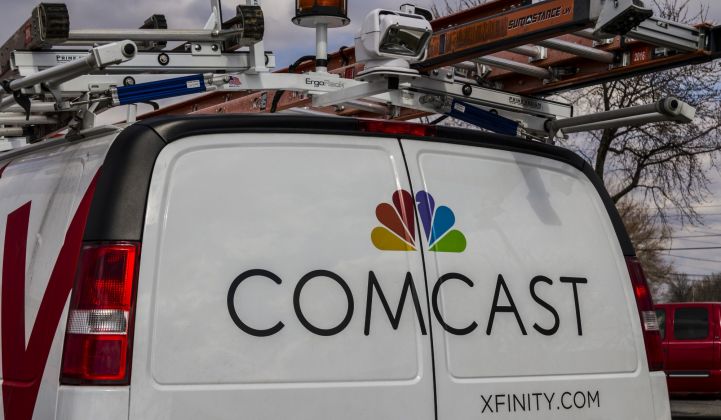Sunrun’s newly announced partnership with telecom giant Comcast is “a big deal” for the residential solar company, for both near-term business prospects and for longer-term strategy, according to CEO Lynn Jurich.
Under the 40-month agreement, Sunrun will be the exclusive residential solar energy provider for Comcast Cable. Comcast will market Sunrun products through marketing campaigns in selected markets, and in exchange Sunrun will pay a fee -- but only once a system originated through the partnership has been installed.
The fee is “materially less” than Sunrun’s current customer acquisition costs, said Jurich, in an interview. According to the company’s latest earnings report, customer acquisition cost Sunrun 54 cents per watt last quarter. With an average system size of around 7 kilowatts, that amounts to just under $4,000 per customer.
That represents one of the highest customer acquisition expenses in the residential solar industry, said Allison Mond, GTM Research solar analyst.
"Even if they’re a little lower than [$4,000] through Comcast, it’s still likely they’re paying substantially more than smaller installers,” she said. “But the fact that they’re paying for a closed customer is a step in the right direction. Many of these public solar companies have spent so much on leads that amount to nothing, which is why their costs get so high overall."
Jurich defended Sunrun’s customer-acquisition expenses by highlighting the additional value that these customer relationships provide. Through a partnership announced with National Grid earlier this year, Sunrun has started to explore the value its customers bring to the utility through grid services. With Comcast, Sunrun will start to explore how solar can enhance the value of other products and services related to the home.
While the partnership launch is focused on marketing solar to Comcast customers, “the agreement does contemplate working together more closely on the Xfinity home platform,” said Jurich. Comcast’s Xfinity Home platform already features a suite of home automation services, including remote control of lighting, door locks, appliances and HVAC systems.
Mond said Sunrun’s Comcast partnership could be an attempt to compete with Vivint Solar, which has plans to better utilize its relationship with Vivint Smart Home to market and install a more comprehensive home energy management system. “This could be Sunrun’s way to rival that,” Mond said.
Solar is key to unlocking the smart home’s full potential, said Jurich. Because it provides such significant savings on a customer’s energy bill, solar can serve as the entry point to more energy-saving and smart-home applications. It’s unclear how much those other applications are worth to the customer, and to the provider, on their own, she said.
“The broader theme is trying to prove real value in customer relationships above the solar contracts,” said Jurich.
In 2015, Comcast tested marketing Sunrun solar to its existing customer base and found that customers who went solar had much higher customer satisfaction with Comcast overall, according to Jurich. At the same time, Sunrun benefited from a new low-cost customer acquisition channel.
Jurich did not disclose the results of the pilot, saying only that she has "confidence" in the data underpinning the new partnership. And the fact that a large corporation like Comcast is interested in participating in home solar indicates it’s a vertical the company believes can reach massive scale and be financially meaningful.
The partnership signals “real validation, informed by real pilot results,” said Jurich. The fact that Comcast sees solar as an opportunity makes it a “mainstream consumer offering,” she said. It also opens up new marketing and acquisition channels beyond door-to-door sales, such as bundled discounts and advertisements through customer cable bills.
If Comcast successfully originates 30,000 installations, the company will earn a 5 percent stake in the solar company, with the potential to own up to 10 percent of Sunrun if the partnership yields 60,000 installations during the 40-month period. Assuming an average system size of 7 kilowatts, the partnership could generate 420 megawatts in new solar contracts. For comparison, Sunrun’s guidance for 2017 is 325 megawatts.
“It’s a great financial arrangement for us,” she continued. “Comcast has 30 million subscribers, and more than half are in the 22 states we currently service.”



